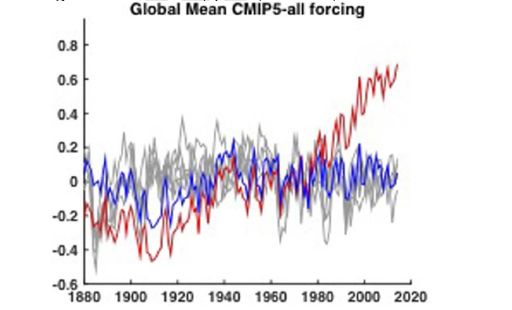Record warm years almost certainly due to human-made climate change

Mean estimated natural variability component (blue) along with five different Monte Carlo ARMA surrogates (gray) using CMIP5 all-forcing experiments. Shown for comparison are the raw observational series (red) 1880-2014. Source: figure 3 of the paper
“2015 is again the warmest year on record, and this can hardly be by chance,” says co-author Stefan Rahmstorf of the Potsdam Institute for Climate Impact Research. The scientists performed a sophisticated statistical analysis, combining observational data and comprehensive computer simulations of the climate system. Their new approach allowed them to better separate natural climate variability from human-caused climate change.
“Natural climate variability causes temperatures to wax and wane over a period of several years, rather than varying erratically from one year to the next,” says lead-author Michael Mann, distinguished professor of meteorology and director, Earth System Science Center, Penn State (US).
“That makes it more challenging to accurately assess the chance likelihood of temperature records. Given the recent press interest, it just seemed like it was important to do this right, and address, in a defensible way, the interesting and worthwhile question of how unlikely it is that the recent run of record temperatures might have arisen by chance alone.”
***Global warming increases risk of local heat extremes***
The newly computed odds for experiencing the recent runs of record temperatures by chance, without accounting for human-caused greenhouse gases, are greater than odds previously reported in some media – between 1 in 27 million and 1 in 650 million – but they are still incredibly slim.
In contrast, taking human-caused global warming into account makes the recent record temperatures quite likely, as the study further shows. Rahmstorf sums up the findings: “Natural climate variations just can't explain the observed recent global heat records, but man-made global warming can.”
What is more, the anomalous global average warmth comes with substantial impacts. “It has led to unprecedented local heat waves across the world – sadly resulting in loss of life and aggravating droughts and wildfires,” says Rahmstorf. “The risk of heat extremes has been multiplied due to our interference with the Earth system, as our data analysis shows.”
Article: Mann, M.E., Rahmstorf, S., Steinman, B.A., Tingley, M., Miller, S.K. (2016): The Likelihood of Recent Record Warmth. Scientific Reports [DOI: 10.1038/srep19831]
Weblink to the article once it is published: www.nature.com/articles/srep19831
For further information please contact:
PIK press office
Phone: +49 331 288 25 07
E-Mail: press@pik-potsdam.de
Twitter: @PIK_Climate
Media Contact
All latest news from the category: Earth Sciences
Earth Sciences (also referred to as Geosciences), which deals with basic issues surrounding our planet, plays a vital role in the area of energy and raw materials supply.
Earth Sciences comprises subjects such as geology, geography, geological informatics, paleontology, mineralogy, petrography, crystallography, geophysics, geodesy, glaciology, cartography, photogrammetry, meteorology and seismology, early-warning systems, earthquake research and polar research.
Newest articles

NASA: Mystery of life’s handedness deepens
The mystery of why life uses molecules with specific orientations has deepened with a NASA-funded discovery that RNA — a key molecule thought to have potentially held the instructions for…

What are the effects of historic lithium mining on water quality?
Study reveals low levels of common contaminants but high levels of other elements in waters associated with an abandoned lithium mine. Lithium ore and mining waste from a historic lithium…

Quantum-inspired design boosts efficiency of heat-to-electricity conversion
Rice engineers take unconventional route to improving thermophotovoltaic systems. Researchers at Rice University have found a new way to improve a key element of thermophotovoltaic (TPV) systems, which convert heat…



